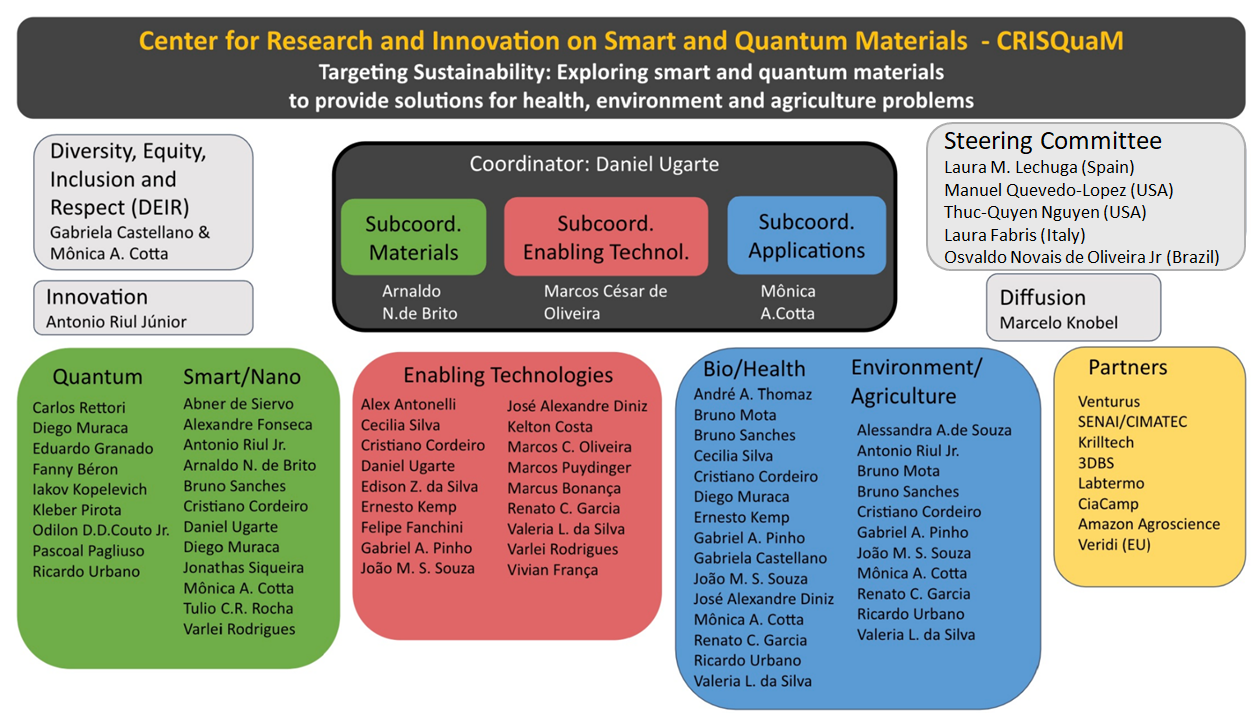BV-FAPESP: research projects supported in this Center
CRISQuaM in the Media: news about the center
CRISQuaM aims to explore the synergistic development of fundamental and applied science to create new materials with high potential for the construction of devices and sensors to address technological challenges related to sustainability, climate change, precision agriculture, ecology, and health. To achieve these goals, we have assembled an interdisciplinary and collaborative research team, integrating expertise across various scientific domains, researching novel materials with high innovation potential. By combining original synthesis methods, advanced characterization techniques, theoretical approaches, computational simulations, quantum technologies, and device construction designs, we aim to drive advances in smart and quantum materials, promoting scientific excellence and technological development. With this, we plan disruptive innovations in instrumentation—including hardware and AI-based tools—as well as in quantum technologies, biomedical devices, and signal processing, in addition to plant bionics, exploring plant-pathogen interactions. Besides research activities, we plan intensive actions in education, dissemination, and communication for the general public, as a modern society should be aware of the challenges humanity faces and how research and technology are essential for responsibly utilizing the planet's limited resources. CRISQuaM's Innovation activities are accelerated through partnerships with several companies in related technologies, many of them Brazilian. Finally, all activities of the Center are managed in accordance with diversity, equity, and inclusion goals and best practices.
The Center brings together scientists, engineers, and innovators in a collaborative effort to apply materials science and quantum technologies at the cutting edge, designing new materials and nano(bio)sensors for advanced diagnostics. The Center has a team capable of producing a wide range of (nano/micro) materials, along with precise chemical and physical characterizations using modern techniques (synchrotron, advanced microscopy, magnetotransport, magnetic resonance, optics, etc.). In addition, the team offers various options in enabling technologies, including miniaturization, processing, and additive manufacturing, as well as instrumentation, quantum sensing, and electronics development. Data analysis will employ updated approaches (numerical simulation, classical and quantum machine learning, and quantum optimization). Applications at the knowledge frontier will address urgent sustainability needs in environmental areas, precision agriculture, plant bionics, and biomedical interfaces, contributing to the development of local technologies in close partnership with the Brazilian industry.
The organization of the Center is based on three pillars — Materials, Enabling Technologies, and Applications — together with partner companies, as described in the figure below.

2025-02-12
Climate change on the prehistoric Iberian Peninsula caused the loss of midsized prey and reduced the supply of food for carnivores, making them more likely to disappear. A study based on fossil records warns of the cascading effect of extinctions in the present.
2025-02-12
Less studied than grasses and trees, these plant species are of enormous importance to the Brazilian savannah biome in terms of biodiversity, carbon storage, regeneration after disturbance, and the provision of ecosystem services such as food and medicine.
2025-02-12
A technology that uses unmanned aerial vehicles developed by a FAPESP-supported startup has enabled Brazil’s leading cosmetics company to complete in six months a census of six species of key importance to its production process distributed across 40,000 hectares of forest in the Amazon.
2025-02-05
The method converts the vinasse left over from ethanol production into a potassium- and nitrogen-rich fertilizer. The groundbreaking study was conducted at the Federal University of São Carlos and published in the Journal of Environmental Management.
2025-02-05
The phase 3 clinical trial showed that Butantan-DV is effective against dengue virus types 1 and 2, which were circulating at the time. The results can be extrapolated for types 3 and 4 based on additional in vitro testing, according to the researchers.
2025-02-05
In a review article, researchers highlight the importance of metrology institutions in setting standards to characterize biopolymers and avoid greenwashing – a marketing practice that deceptively promotes products as being environmentally friendly.